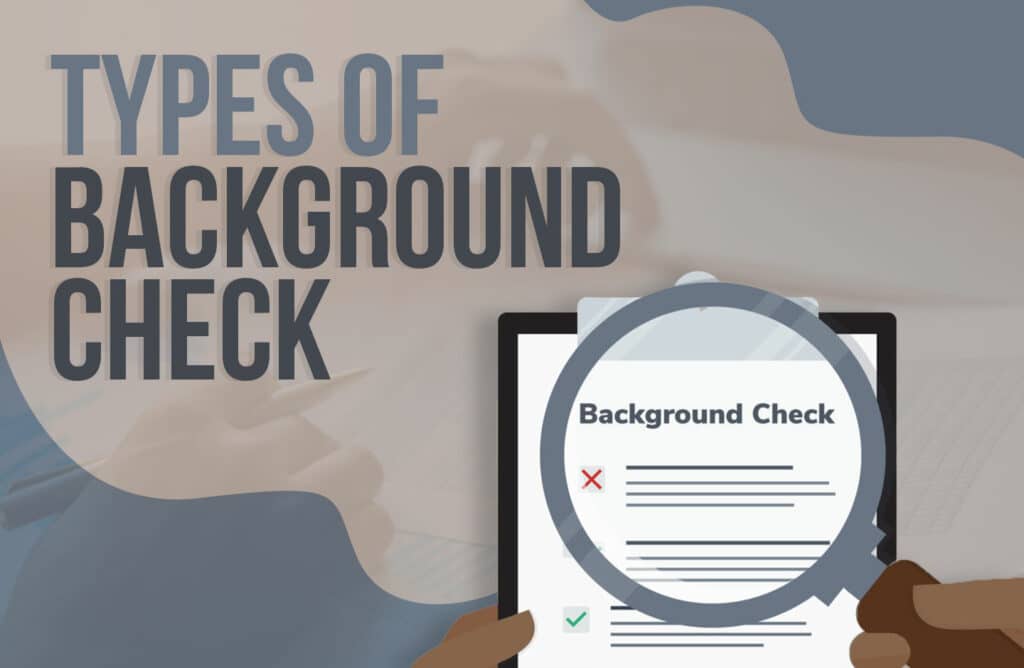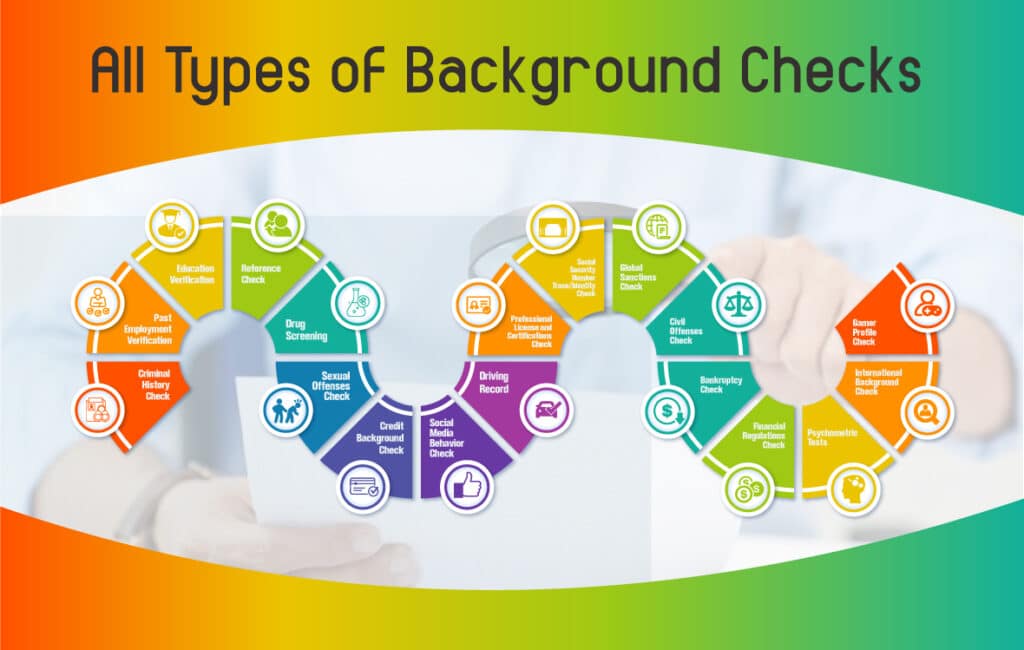Types of Background Checks: Find Out What They Cover

Background checks have become a vital part of the hiring process. There is always more than meets the eye with new staff members. Background checks help employers verify that the potential employee is who they say they are and have the necessary experience for the role.
There are various types of background checks employers can use to screen job applicants. Each has a different focus and gives you a holistic view of the applicant’s life, history, and experience. It can even help you understand if the applicant has any history of drug abuse.
It is essential to understand the different types of background checks so you can utilize them accordingly. We have compiled a list of the different types of background checks and how they work. This article will help employers understand which checks are needed to minimize risks and ensure they hire an ideal candidate.
Need a Background Check?
Get StartedWhat Are the Various Types of Background Checks?

There are many types of background checks available for different situations. Here is a list of 18 background checks employers commonly use to verify a new hire:
- Criminal History Check
- Past Employment Verification
- Education Verification
- Reference Check
- Drug Screening
- Sexual Offenses Check
- Credit Background Check
- Social Media Behavior Check
- Driving Record
- Professional License and Certifications Check
- Social Security Number Trace/Identity Check
- Global Sanctions Check
- Civil Offenses Check
- Bankruptcy Check
- Financial Regulations Check
- Psychometric Tests
- International Background Check
- Gamer Profile Check
1. Criminal History Check
When we think of a background check, our minds automatically go to a criminal history check. This is perhaps the most commonly used background check.
A criminal history speaks a lot to the character of a person. Certain organizations often want to know if their applicants have any prior criminal history. This can help an employer determine whether the person poses any threat to the customers or would create an unsafe working environment.
Criminal background checks are performed based on name, fingerprint, and employment history variations. Certain states do not allow employers to get unofficial background checks through a 3rd party service. Before conducting a criminal background check, ensure you know what your state laws allow for and how you can use the search during the hiring process.
A standard criminal history check will search for records in the following:
- Federal and state criminal records
- National criminal databases
- Domestic and global terrorist watch lists
- Sex offender registries
- County criminal courts
If the person has any criminal records, they can be found will be in one of these databases.
2. Past Employment Verification
It has become a norm for job applicants to lie about their employment history in order to get a job. Employers need to confirm a candidate’s employment history to verify if they have the necessary experience for the job.
An employment verification reveals more than just the candidate’s past work history. It also gives insights into their integrity, loyalty to their previous employers, and job stability. If there are any gaps or inconsistencies in their employment history, it will be easy to question them about it.
An employment eligibility verification will help hiring managers confirm:
- Job start and end dates
- Job duties and roles
- Position held at the job
- Salary range
- Details of compensation/perks
- Reason for termination or leaving the company
Many job applicants exaggerate or lie about their employment history for one reason or another. This check serves as a proxy for their honesty and integrity.
3. Education Verification
Mere attendance data does not translate to graduating. Many candidates often try to pass off the former as the latter. An education verification helps hiring managers verify the candidate’s true level of education.
Certain positions require specialized or advanced education. Misrepresentations of academic qualifications can have an adverse impact on hiring outcomes, especially if there is a lawsuit or encounter with the authorities.
Employers should be able to prove their employees have the appropriate credentials. One can only be certain after conducting an education verification check.
4. Reference Check
Before buying a product, don’t you like to check customer reviews to see how good or bad they are? Well, a reference check does the same for you but with potential hires.
There’s no better way to verify the qualities of an individual than through a reference check. It helps you understand the person’s work ethic, how they collaborate with other employees, and more. It also helps hiring managers better understand a candidate’s professional contributions in former workplaces.
However, a reference check is quite different from a background check. A background screening is done to verify a candidate’s credentials and professional experience. On the other hand, a reference check is done to verify a candidate’s on-job performance and attitude.
Employers can also do a back-door reference check if they want a more comprehensive and objective assessment. In this case, they check in with the candidate’s former colleagues and managers. These are people who are not listed as references.
5. Drug Screening
A drug screening is mandatory for certain industries like aviation or driving. As an employer, you may want to conduct a drug screening for a potential hire. A drug screening helps you determine whether there are any illegal drugs or alcohol in the candidate’s system.
It is important to have physically and mentally fit candidates for certain positions that could put other people at risk. Drugs and alcohol use can make one incapable of performing their duties. It also lowers productivity in the workplace. These tests help to verify that a candidate is in the best physical and mental state to conduct their duties.
You will most likely need to notify potential candidates of the drug test in advance. These tests can be done through a urinalysis, breathalyzer, or hair testing.
Pre-employment screening for drug use is vital to ensure the workplace is safe for other employees and potential customers.
6. Sexual Offenses Check
Employers need to screen potential employees for sexual offenses. This type of background check will help determine if an applicant has a history of sexual offenses.
This information is especially vital when hiring someone in a position that deals with minors, students, schools, or even daycares. You can never be too sure about the kind of people you bring around children.
In order to mitigate any risks of sexual offenses, it is good to check the candidate’s sexual offense history. It also helps to protect an employer against damage claims should an incident happen and they are held liable.
7. Credit Background Check
How fiscally responsible is your new hire? Well, a simple credit background check will help you figure that out. This type of background check looks into the credit history of your candidate.
Certain rules govern employment background checks, especially credit checks. These rules are set under the Fair Credit Reporting Act (FCRA) and help protect employees’ rights.
These credit reports have to be sourced from credible credit agencies. Three of the largest credit agencies are TransUnion, Experian, and Equifax. You can typically get these reports for free.
Remember that a credit background check can only be performed with the permission of the candidate. In some states, however, using credit scores to make hiring decisions is illegal, so check your local laws.
8. Social Media Behavior Check
You can learn a lot about a person from the things they post online. A deep dive into the social media accounts of potential employees can tell you more about them.
A social media background check helps to form a rounded assessment of a potential hire. It is a window into their attitudes, likes, dislikes, and ways of thinking.
The information received from a social media background check should be compared to the other information provided in their application or other types of background checks performed. Social media can help to point out discrepancies.
In a job position where brand reputation is everything, a social media check is vital. It helps to reduce the risk of tainting the brand’s reputation or breaching the company’s internal matters.
9. Driving Record
Does the position require driving? It is good to check the driving record of potential job candidates to prove that they have a safe driving history and are not a danger to others.
This is an especially important background check for potential ambulance drivers, delivery drivers, school bus drivers, Uber drivers, and more.
A driving record background check will reveal:
- Previous accidents or traffic violations
- The current status of their driver’s license
- Points on their license
- Instances of ‘driving under the influence.
- Other violations, fines, or convictions
Most states require you to obtain the candidate’s permission before conducting this type of check. To run this test, you will need:
- The candidate’s full name
- Date of Birth
- Current Address
- Social Security Number
- Driver’s License Number
- Date of Issue
- A signed release from the candidate (per Fair Credit Reporting regulations)
10. Professional License and Certifications Check
Fraudulent professional credentials are among the top falsehoods job candidates include on their resumes. Everyone wants to get hired and stellar professional credentials can be a major help. That’s why hiring managers must establish whether the certificates and licenses are legitimate.
A professional license and certifications check can confirm the validity of an applicant’s stated licenses and certificates. Because most hires and promotions are made based on these credentials, this is a crucial piece of information to confirm.
11.Social Security Number Trace/Identity Check
Identity theft is a common occurrence and many have done it to get hired. A social security number trace or identity verification check can help you determine whether the candidate is who they claim to be.
A social security number is a basic requirement on nearly every job application. It can help new employers verify their applicant’s past employment history and even previous earnings.
Additionally, it can help employers verify that the candidate is eligible to work in a particular country. This information can help a lot with identity verification.
12. Global Sanctions Check
A global sanctions check verifies whether the job applicant has broken any law with international law enforcement agencies. It also checks whether they have any violations with sanction bodies and financial regulators.
This type of background check is commonly used to verify crimes pertaining to money laundering, drug traffic law violations, terrorism, financial irregularities, and sharing unauthorized technologies.
It is good to verify that your new hire has not broken any global laws with criminal background checks that access worldwide records.
13. Civil Offenses Check
Civil court records don’t report criminal convictions, but rather civil court records that pertain to the candidate’s history.
A civil offenses check helps to verify whether selected candidates have any non-criminal lawsuits at the county or state level. These types of cases could include a breach of contract, debt relief orders, medical negligence, etc.
Civil background checks are very important for jobs that have financial roles. Candidates with a long debt history may be unsuitable for positions that handle money directly. If they have a history of making compensation claims against their employers, for example, it is likely they could do the same to a new employer.
14. Bankruptcy Check
If you are hiring for a senior position that entails considerable financial autonomy, a bankruptcy check will help assess the candidate’s financial viability. It would be irresponsible to put someone with money troubles in a position that handles a lot of money.
This search helps to verify a candidate’s financial integrity, responsibility, and ability to make financial decisions. Bankruptcy can be reason enough to bar one from holding certain positions. This search will also reveal a candidate’s debt record if they failed to repay something within the given time.
15. Financial Regulations Check
Another important background check to conduct for hiring in positions in the financial service industry is a financial regulation check.
This helps to verify if the applicant has performed any financially regulated activities in the past and has since received sanctions from a financial regulatory body.
The check will provide extensive details of any disciplinary actions against the candidate by a financial regulatory authority.
16. Psychometric Tests
Psychometric tests are becoming increasingly popular in the hiring process. These tests help to assess a candidate’s performative skills, personality traits, knowledge, and job potential.
These tests are delivered in the form of test questions with time constraints to determine how sharp a candidate is.
Psychometric tests typically assess three key areas:
- Aptitude Tests: Questions that test a candidate’s cognitive skills.
- Behavioral Tests: Questions that help to reveal an applicant’s behavior and personality traits. This could speak to their suitability or unsuitability for certain roles.
- Assessment Centers: These tests use job-specific skills via human interaction to assess a candidate’s qualifications.
Other types of psychometric tests include numerical tests, verbal tests, logical reasoning tests, abstract reasoning tests, deductive reasoning tests, and spatial reasoning tests. Some more look at error checking, concentration, technical, and diagrammatic reasoning.
17. International Background Check
If your new hire is from another country, you may want to do an international background check. These types of background checks will help you get records from other countries.
An international background check can verify the candidate’s education history, employment history, criminal records, and more. If there is anything that stands out from the other countries, you should be able to find it with this type of background check.
18. Gamer Profile Check
A gamer profile check is a new type of background check that helps to verify gaming profiles.
This check helps to weed out fake profiles or scammers and ensure only legit players are within the gaming environment.
This is a unique way to keep the gaming world secure and instill confidence in other gamers.
Run a Background Check on Yourself
Ensure the accuracy of your personal records
Type of Background Checks FAQs
Here are some of the frequently asked questions on the different types of background checks.
What Causes a Red Flag on a Background Check?
The most common red flags on a background check include criminal records, arrest records and discrepancies across your employment or educational background. Other red flags include short-lived jobs, failed drug tests, questionable posts on social media, poor credit history, and bad references.
Can a Background Check Show Past Employers?
Yes, a background check can show past employers. When you run employment background checks, it helps to reveal past employers.
What Is a Light Background Check?
A light background check is a soft inquiry made by an employer. It could include the person’s credit history, identity verification, driver’s history, and more. These often occur without the candidate’s express permission.
Can a Candidate With a Criminal Record Still Get Hired?
Yes, a candidate with a criminal record can still get hired. Some employers are lenient on people with criminal records, depending on certain factors. These factors may include the nature of the crime, the relation of the crime to the job, the period since the conviction, and if the candidate has been acquitted of the charges.
The Equal Employment Opportunity Commission also prohibits employers from discriminating against candidates based on criminal backgrounds. Employers are encouraged to give equal consideration to candidates with criminal records.
Why Are Background Checks Important to Employers?
Background checks are important to employers help to mitigate all hiring risks and build a trusted team of employees. Background checks facilitate objective, fair, informed, and solid hiring decisions. They also help to ensure a safe working environment for other employees, customers, and clients.
Types of Background Checks: Key Takeaways
Employers can take advantage of different types of background checks during the hiring process. These checks give an insight into a candidate’s personal, professional, financial, and social life. It makes the hiring process much easier.
But, not all background checks are necessary for all jobs. Pick the best background check that provides information directly relates to the job.
Disclaimer: The information provided on this website does not, and is not intended to, constitute legal advice; instead, all information, content, and materials available on this site are for general informational purposes only. Information on this website may not constitute the most up-to-date legal or other information. This website contains links to other third-party websites. The Justice Collaborative may receive a commission when users click on the links and make a purchase on the third-party website.
The views expressed are those of the individual author. All liability with respect to actions taken or not taken based on the contents of this site are hereby expressly disclaimed. The content on this posting is provided “as is;” no representations are made that the content is error-free.
Reviewed by : Benjamin Walsh
Published : March 26,2024
Written by : Stephane Bandeira
Published : March 26,2024
Published : March 26,2024
table Of Content
Reviewed by : Benjamin Walsh
Published : March 26,2024
Written by : Stephane Bandeira
Published : March 26,2024
Published : March 26,2024

